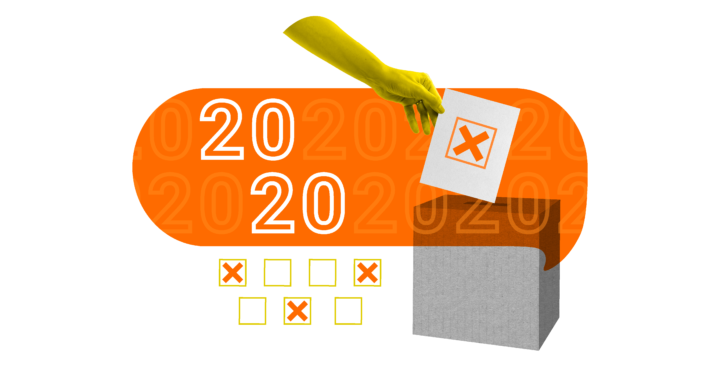
Survey of the Puerto Rican Electorate
These are the results of our survey on the levels of trust in government and civic engagement in the electoral process.
Identity, relationship with the United States, and status
Of the people surveyed, 86.1% think that Spanish is an essential part of the Puerto Rican identity. Furthermore, 73% of those surveyed said they wanted to be able to vote in federal elections in the United States. However, 57% of respondents fully or partially agree with the premise that Puerto Ricans in the diaspora should be able to participate in the island’s political decisions.
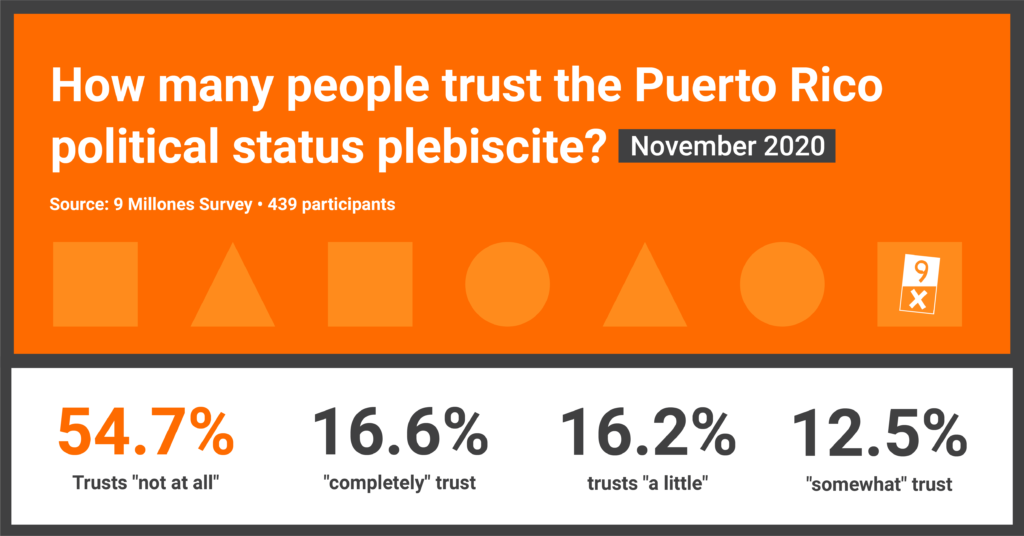
Trust in government
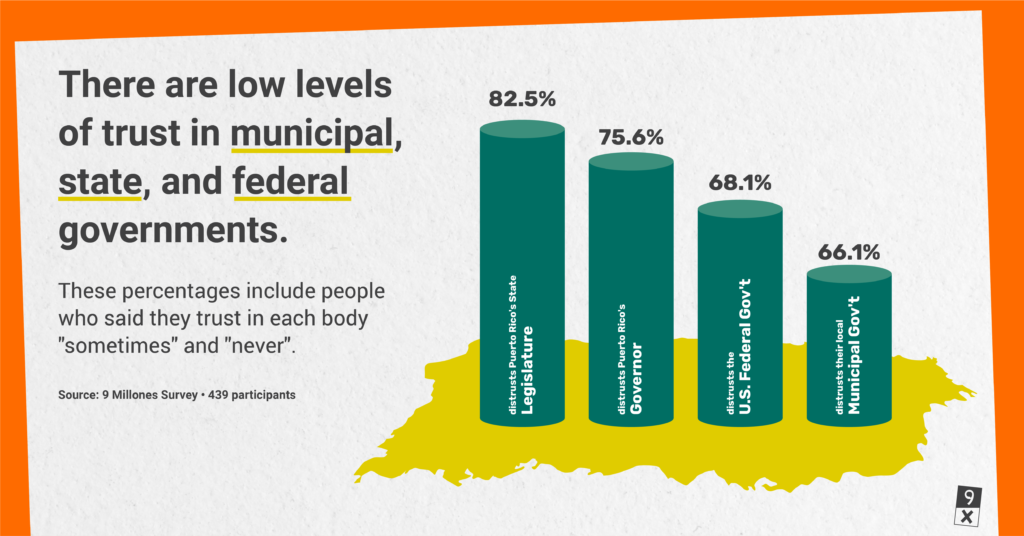
Recent natural events
Of those surveyed, 56.5% said they suffered damage due to Hurricane María in 2017, as opposed to 15.7% due to the earthquake that occurred at the beginning of 2020 — which were concentrated in the southwestern part of the island. 61.1% of participants described the response of the government of Puerto Rico to the hurricane as “poor;” 53.5% and 43.3% said the same about the earthquake and the COVID-19 pandemic, respectively.
Fewer people described the federal government’s response to the hurricane (38%), the earthquake (41.5%), and the pandemic (39.9%) as “poor.” In other words, respondents rated the federal government more highly than the local government. Emphasizing this point, 65.2% of those surveyed indicated that they now have less confidence in the ability of the local government to respond to natural events like these.
Civic and electoral engagement
The participants in this survey represent an active segment of the population when it comes to politics: 58.5% of those surveyed have “a lot” or “some” interest in politics, and 82.5% voted in the 2016 elections. That vote was split almost equally among the candidates for the New Progressive Party (PNP), Ricardo Rosselló (38.4%), and for David Bernier (37.3%) of the Popular Democratic Party (PPD). No party has the support of the majority of those surveyed: 32.4% support the PNP, 24.8% the PPD, 13.2% the Puerto Rican Independence Party (PIP), and 11.2% the Movimiento Victoria Ciudadana (MVC). Along the same lines, the recently launched Proyecto Dignidad and the emerging Movimiento Conciencia obtained the support of 4.6% and .07% of respondents, respectively. Despite this high level of interest and electoral participation, 69% did not participate in the protests to oust Roselló during the summer of 2019.
The survey included a question where we presented participants with a list of 23 problems facing Puerto Rico today and asked them to identify the main problem based on their own criteria. Most participants, 28.9%, chose corruption as the main problem. The economy ranked second (9.8%) while the political status ranked third (8.7%). When voting, however, respondents attribute the highest importance to the health system, followed by corruption, and the education system.
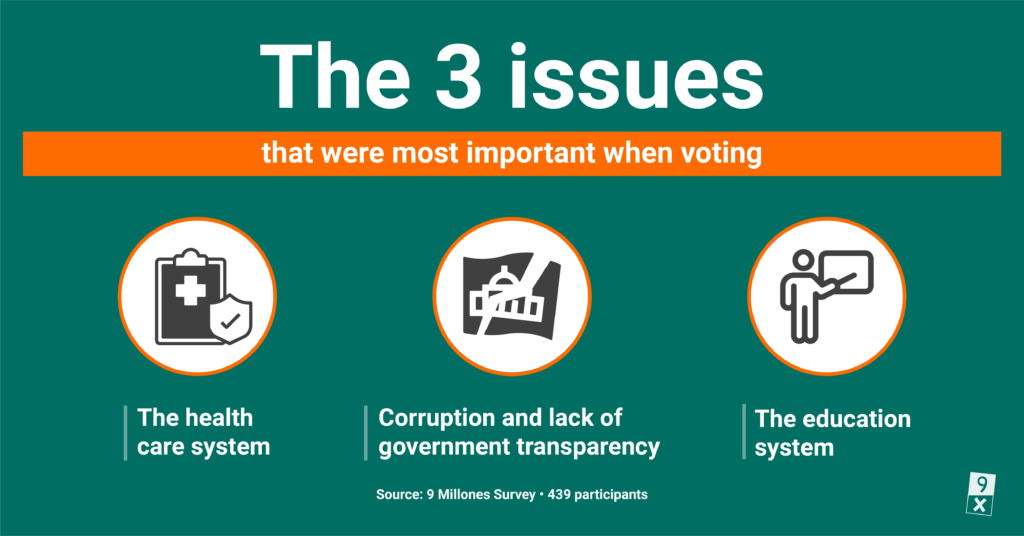
93.9% of respondents indicated that they were completely sure they were registered to vote in November 2020 and 95.1% indicated that they planned to vote or had already voted in advance. The majority also indicated having knowledge of where they had to vote. Among the gubernatorial candidates, Pedro Pierluisi received the most support (27.5%), closely followed by Juan Dalmau (24.7%) and Carlos Delgado (24.2%). Like the parties, no candidate had the support of the majority. It is noteworthy that 36.8% of the people who prefer statehood indicated that they did not plan to vote for Pierluisi but would vote for one of the other candidates. Furthermore, of the 59 people who did not vote in 2016 but did vote in 2020, the majority voted for Dalmau (24) and for Alexandra Lúgaro (13), followed by Delgado (11), Pierluisi (9), and César Vásquez (2).
Lastly, when asked how they prefer to get informed about politics, Facebook was the most common response, followed by television news programs, newspapers, and websites.
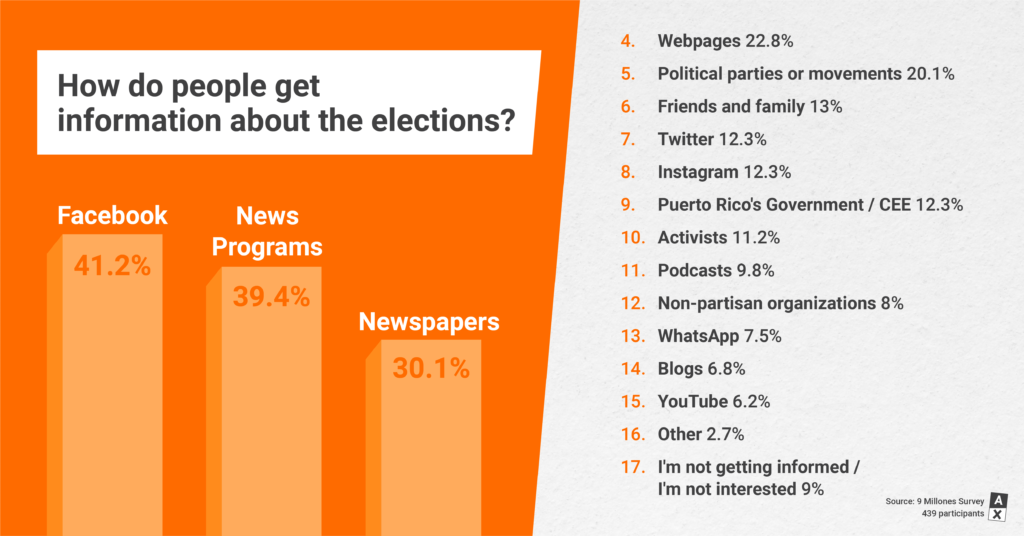
Age discrepancies
There are substantial age differences in respondents’ media diets. The average age of people who prefer to get their news from newspapers or television news programs is 56 and 53 years old, respectively. The average age of people who use Facebook as their main information platform drops to 47 and 38 when it comes to Twitter.
However, the proportion of respondents under 45 who chose Facebook as their preferred media is equal to the proportion of respondents over 45 who chose it. This means that this is the most used media platform in the younger group and the second most used in the older group (surpassed, by two points, by television news programs). [Note that survey participants were recruited through Facebook, email and WhatsApp.]
There is a large difference between both groups in the consumption of information through television news programs (73% in the older group and 59% in the younger group), Instagram (8% in the older group and 42% in the younger group), Twitter (12% in the older group and 36% in the younger group), political parties or movements (26% in the older group and 48% in the younger group), activism or activist pages (8% in the older group and 37% in the younger group) and non-partisan organizations (7% in the older group and 24% in the younger group). In general, respondents under 45 years of age consume information through a greater variety of media platforms, , unlike people over 45 who seem to get most of their information through three sources: news programs, Facebook, and newspapers.
There are also significant age gaps in civic engagement. Most of the respondents under 45 years of age (55%) participated in the protests to oust Roselló during the summer of 2019, while only 22% of those over 45 said they participated. Regarding electoral participation, it’s interesting to note the age gap of active voters in 2016 (87% of those over 45 years old said they had voted compared to 67% of those under 45 years old) disappeared in 2020 (94% among those over 45 years of age over 45 and 97% among those under 45).
Respondents’ partisan identification also differs considerably by age. While the PNP and PPD enjoy higher levels of support among those over 45 (41% and 29%, respectively) compared to those under 45 (11% and 14%, respectively), the opposite is true in the case of MVC and PIP. Both parties have higher levels of support among the younger group (27% and 22%, respectively) than among the older group (5% and 10%, respectively).
Likewise, there are substantial age discrepancies in what respondents identify as the major problems facing Puerto Rico today. Those under 45 are more likely than those over 45 to point to corruption as the biggest problem. Other notable differences by age — although these problems were not ranked among the most important — are evident in the case of “the lack of family, religious and/or moral values” (much more important for those over 45 years of age than for the under 45 years) and “the rights of the LGBTQIA+ community” (much more important for those under 45 than for the older group). This simple analysis suggests that there may be a generation gap in the priority given to different social problems.
This story was written by Viviana Rivera Burgos. Rivera Burgos is an assistant professor in the Political Science Department at Baruch College in the City University of New York that specializes in American public opinion and political behavior, particularly as they relate to people of color. She received her Ph.D. from Columbia University and B.A. from the University of Puerto Rico-Mayagüez.
Ana Castillo edited the piece.
To access the topline results, contact info@9millones.com.